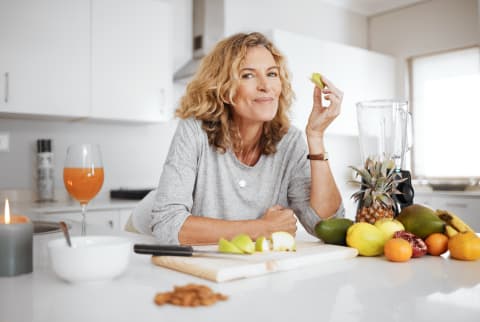Advertisement
How To Use Food To Deal With Menopause Symptoms: 6 Things To Reach For


As women progress through various life stages, they may need to tailor their eating habits a bit. As a registered dietitian, I see menopause as one phase that often requires a nutritional check-in, due to its unique impact on our hormones.
For most women, uncomfortable menopause symptoms could last over a handful of years—primarily due to the decline of estrogen. As estrogen steadily declines and disrupts metabolism, it could cause weight gain as well as changes in cholesterol and blood sugar due to the slower digestion of starchy carbs1. Estrogen changes also affect bone density. Calcium levels may decrease2, which leads to osteoporosis for some.
Therefore, it is beneficial to focus on good nutrition during menopause, not only to help alleviate any discomfort but also to stay as healthy and strong as possible during this life phase.
While there is no "menopause diet" that works for everyone, I typically recommend focusing on wholesome foods during this life stage. I've found that foods that generally fall under a Mediterranean-style eating pattern are the best for alleviating symptoms. These include:
Milk and cheese
Dairy products such as whole milk Greek yogurt and low-moisture cheese are great sources of calcium that can help mitigate the loss of bone density during menopause. Yogurt contains probiotics, which also benefit gut health and bone health. In addition, the consumption of dairy could help improve sleep quality3 during menopause (assuming lactose intolerance is not an issue).
Whole grains
Whole grains are beneficial to help manage blood sugar fluctuations. Whole grains such as brown rice, whole-wheat flour, kamut-based pasta, and quinoa are all options to integrate. Remember: Portion control is important with carbohydrate consumption, due to estrogen's effect on blood sugar.
Lean animal proteins
Lean sources of protein can help mitigate the decline in muscle mass as you age. With the loss of calcium and subsequent bone density, adequate dietary protein is important for maintaining muscle mass and hopefully preventing fractures and breaks in bones. Food sources such as eggs, lean animal protein, and collagen are beneficial to integrate.
Fruits & veggies
Fruits and vegetables are vital at every stage of life, given their vast vitamin and mineral content. Eating meals that are at least 50% vegetables can help with blood sugar stabilization, and high-fiber vegetables can also promote satiety and prevent overeating. Fruits are a good source of fiber as well but should be consumed in moderation, as too much fruit can spike blood sugar. A diet rich in plant foods could boost your immunity4 as well.
Legumes
Legumes are a good source of plant-based protein and fiber, which help regulate blood glucose. Options like lentils, chickpeas, and black beans also provide a source of magnesium, an essential mineral.
The takeaway
Hormonal fluxes during menopause can negatively affect blood sugar, cholesterol, and bone density. To combat these potential side effects, I recommend my clients eat a Meditteranean-inspired diet rich in whole grains, lean animal proteins, fruits, vegetables, legumes, and some dairy products.